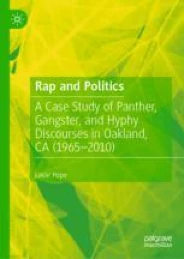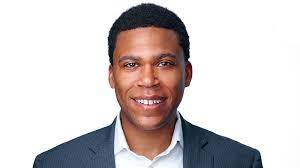Graduate Program Alumni Publications
Lavar Pope


Rap and Politics
A Case Study of Panther, Gangster, and Hyphy Discourses in Oakland, CA (1965-2010)
We are excited to announce that Professor Lavar Pope (PhD 2012) has published a book titled Rap and Politics: A Case Study of Panther, Gangster, and Hyphy Discourses in Oakland, CA: 1965-2010 (Palgrave, 2020).
A reviewer described the book as the only "comprehensive book on Hip-Hop culture focused specifically on one area or region” and "an excellent addition to political science and to Hip-Hop studies because his comprehensive text focuses on a specific area where Hip-Hop developed and the sound that was created in that area”. Professor Pope's research is concerned with the question of whether rap music can be construed and studied as a form of political discourse and how it is related to urban Black political discourse since the 1960s. Some scholars argue that rap has little political relevance whatsoever (see, for example, Lester Spence's recent book Stare into Darkness). Others assume there is a relationship between Black political struggles and rap music, but the nature of this relationship is not usually spelled out in any clear way. Professor Pope's study of Oakland, on the other hand, puts the political content of rap music at the center of his analysis and explores it "as a movement that filled a void after the apex of the Black power movement." Rap music he argues is not just music; it "serves a political function as the successor of Black Power messages into locally-based styles resistant to cooptation." It is a subversive, oppositional discourse that emerges in the context of the deterioration of Black life in America's inner cities after the civil rights revolution. Rap music is part of long history of Black music, going back to slavery, as a discourse of resistance. He writes, "rap music is an element of hip-hop culture that can effectively use quotidian narratives as a means of transforming individual, subaltern positions into community sources of power centered on being seen, heard, and felt." When these narratives are connected to the Black power movement of the 1960s, they are "understood as heirs to a militant, radical, political movement.” The first move in that political discourse was based on a politics of visibility, he explains in the book: an effort to force listeners to grapple with the violence, social turmoil and hustling of the inner city. Regardless of the message listeners took away from the music - whether listeners thought the music was misogynistic or violent - the rappers were making daily life in the inner city a visible and popular topic of concern for a wide audience. We commend Professor Pope on the publication of such a rich book on an important topic.
Sarah Romano

Transforming Rural Water Governance
The Road from Resource Management to Political Activism in Nicaragua
In Transforming Rural Water Governance Sarah T. Romano explains the bottom-up development and political impact of community-based water and sanitation committees (CAPS) in Nicaragua. Romano traces the evolution of CAPS from rural resource management associations into a national political force through grassroots organizing and strategic alliances.
Reviews:
"Transforming Rural Water Governance addresses the importance of local activism in response to a changing climate and incorporating a new perspective of environmental justice in Nicaragua, where access to clean water plays a much more intrusive role in the minds of its citizens."—Morgan S. Abbott, Economic Botony
“This insightful and highly readable book will be useful for anyone interested in water governance, collective action, and social movements.”—Catherine M. Tucker, author of Changing Forests: Collective Action, Common Property, and Coffee in Honduras
“Romano’s focus on water providers that operate ‘below the radar’ of public policy-making is especially important in the water sector.”—Madeline Baer, author of Stemming the Tide: Human Rights and Water Policy in a Neoliberal World
